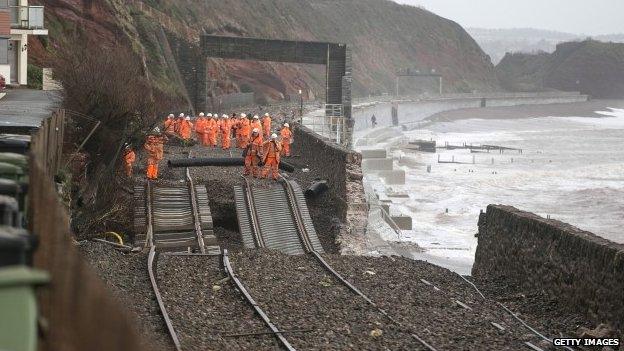Flood damage 'devastated' South West economy
- Published

Network Rail said it hoped to be able to reopen the main line ahead of its mid-April target
Floods that disrupted rail services in south-west England have "devastated" businesses and tourism in the region, MPs have been told.
Cornwall's tourism industry has lost millions of pounds, according to the local enterprise partnership.
Tudor Evans, the leader of Plymouth City Council, said there was also a massive cost to local businesses.
West Country leaders were appearing before the House of Commons Transport Committee to speak about the floods.
Mr Evans said when storms destroyed the sea wall at Dawlish, leaving the main railway line suspended in mid-air, Devon and Cornwall were effectively cut off.
"All this has had a devastating effect on the economy of the area," he said.
Alternative options
Mr Evans said he doubted whether any other country in Europe would tolerate such a situation.
Torbay Mayor Gordon Oliver said the flooding had also had a big effect on tourism in the region.
He said it had needed "ministerial drive" to get things done after the floods struck, adding that the area had been neglected in rail terms before the stormy weather.
Devon County Council's chief executive, Phil Norrey, said even before the floods, the region had been suffering from engineering work that meant services west of Exeter had been disrupted since early January.
Tracey Lee, the chief executive of Plymouth City Council, said when the delegation met Transport Secretary Patrick McLoughlin earlier, he told them he had asked Network Rail to look at "all options" for south-west England.
"We have seen study after study after study - the studies have become an industry in themselves," she said.
"The issue is - where is the investment?"
Network Rail told the transport committee it had been working round the clock at Dawlish and hoped to reopen the railway line before its target of mid-April.
- Published25 February 2014
- Published6 February 2014
- Published5 February 2014
- Published4 February 2014